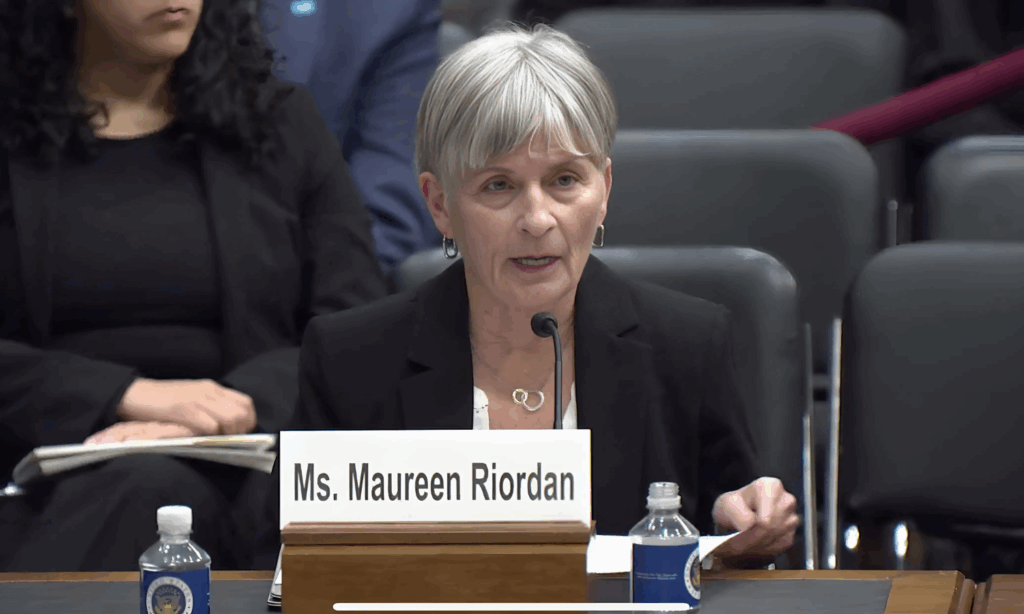DOJ’s New Top Voting Lawyer Worked for Leading Anti-Voting Law Firm

The new top voting lawyer at the Department of Justice was until recently an attorney and activist for a leading anti-voting legal group that has worked for years to spread fear about illegal voting and press election officials to tighten voting rules.
The lawyer, Maureen Riordan, also has appeared with Cleta Mitchell — the right-wing activist who played a key role in President Donald Trump’s failed bid to subvert the results of the 2020 election — backing Mitchell’s pledge to “reclaim our election systems from the left.”
Riordan’s appointment, which has not been formally announced by the DOJ, underscores the sharp reverse the department and its voting section have undergone under Trump — from their previous role as a largely consistent defender of voting rights to instead working actively to undermine them.
A new lawsuit filed Tuesday by the DOJ against North Carolina lists several attorneys on the case, including Riordan, who is identified as “Acting Chief, Voting Section” – the unit tasked with enforcing the nation’s voting rights laws.
The lawsuit, which cites Trump’s March executive order intended to tighten voting rules, aims to require North Carolina to do more to collect missing information that’s required by law from people registering to vote. Historically, lawsuits filed by the Justice Department’s voting section have almost exclusively aimed to expand voting access, rather than to restrict it or enforce stricter rules.
Riordan spent nearly 17 years as a lawyer at the voting section, according to her LinkedIn bio. But from 2021 until this month, she served as litigation counsel at the Public Interest Legal Foundation (PILF).
“No comment here,” a Justice Department spokesperson said when Democracy Docket asked about Riordan’s hiring.
A PILF spokesperson did not respond to a request for comment about the timing of Riordan’s move.
PILF specializes in pressuring states and counties — by threatening and bringing litigation — to more aggressively remove voters from the rolls. As part of that effort, it has worked to stoke fear about the threat of non-citizen voting, which is extremely rare. A 2017 PILF report titled “Alien Invasion” claimed to have found thousands of ballots cast by non-citizens in Virginia. Election administrators and reporters found numerous flaws in the report’s methodology.
A case in which PILF represented Galveston County, Texas, which was being sued under the Voting Rights Act (VRA), led to a ruling that significantly limited the law’s ability to protect the voting power of racial minorities in the 5th Circuit.*
PILF’s founder and president, Christian Adams, resigned from the DOJ’s voting section in 2010 after the department declined to pursue a case involving alleged intimidation of white voters by a Black activist.
The group’s board of directors includes prominent leaders of the conservative push to restrict voting, including the Heritage Foundation’s Hans von Spakovsky and Ken Blackwell of the Trump-aligned America First Policy Institute. A former PILF director, John Eastman, concocted a plan to allow Trump to stay in power after the 2020 election by having then-Vice President Mike Pence throw out electoral votes for Joe Biden in key states.
Among Riordan’s legal work for PILF was a 2024 amicus brief in a Republican case that aimed to strike down New York’s vote-by-mail law. Restricting mail voting has been a top priority for the GOP nationwide.
In 2022, Riordan appeared on a podcast hosted by Mitchell, who participated in Trump’s infamous December 2020 phone call on which he pressed Georgia Secretary of State Brad Raffensperger (R) to find enough votes to hand him the state. Mitchell is a former chair of PILF.
“What we have now is an election integrity movement,” Mitchell declared on the podcast with Riordan. “And we want to keep building on that and training people and deploying them in a way that actually does reclaim our election systems from the left.”
“I agree,” said Riordan.
Riordan also has frequently accused the voting section at the DOJ of favoring Democrats and racial minorities.
Riordan told Mitchell the voting section was “populated with attorneys and staff from far-left organizations.” She described her former DOJ colleagues as ideologues “aligned with progressive interest groups” and “activists, not neutral enforcers of the law.”
In congressional testimony in 2021, Riordan accused “partisan bureaucrats” in the voting section of having “disdain for the equal application of civil rights laws to all Americans.” She cited the opposition of some staff in the section to the DOJ’s prosecution of a Black Mississippi man for violations of the Voting Rights Act — a case led by Adams.
Riordan has been vocal in opposing federal legislation to fight voter suppression. In a 2021 House Judiciary hearing, she claimed the John Lewis Voting Rights Advancement Act would “federalize our elections by requiring almost every single change to elections to be approved by DOJ bureaucrats.”
Riordan also has expressed skepticism that racial discrimination in voting remains an issue. Until it was neutered by the Supreme Court in 2013, preclearance was the Voting Rights Act’s strongest tool, requiring jurisdictions with histories of discrimination to seek federal approval before changing voting laws. But Riordan argued in that same hearing that it’s no longer necessary because the racially discriminatory conditions it was created under no longer exist.
“The nexus of preclearance and low minority political participation and success no longer exists,” Riordan said.
*This sentence has been corrected from an earlier version which incorrectly reported that PILF sued Galveston County. We regret the error.